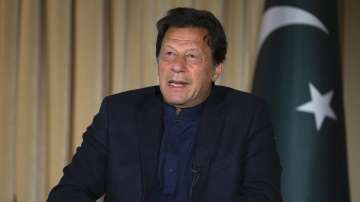The Imran Khan government, which is already under pressure for being unable to exit the Financial Action Task Force (FATF) grey list, has reasons to be seriously worried after the ISIS-K driven twin bomb blast in Kabul left at least 100 dead and many injured.
Islamabad has been in the grip of an intense of "triumphalism" as the Taliban assumed power in Afghanistan following the withdrawal of US troops but "deep down" there are concerns as it could once again be in the spotlight for its direct links with terror outfits.
Pakistan based think tank Tabadlab estimated a cumulative real GDP loss of approximately $38 billion that Pakistan has incurred between 2008 and 2019 on account of FATF grey-listing.
Given that Islamabad has been making all attempts to come out of this list, it would hope that the Taliban 2.0 are different from the earlier avatar and that they put up a more liberal and inclusive face.
Former Indian High Commissioner to Pakistan TCA Raghavan, speaking at the webinar organised by India Writes Network, noted that while there is a sense of triumphalism in Pakistan at the defeat and "humiliation" of the US in Afghanistan, Islamabad too never expected the "unilateralist" Taliban to grab power so rapidly.
"I don't think they expected quite such a walkover..and certainly, they are worried about the implications now of a Taliban, which is unilateralist, which is backward looking, which draws Western and the US negative sentiments, and makes Pakistan again, the eye of Western and American censure," Raghavan said.
The China angle
Concerns for Beijing have also risen especially after the recent suicide attack at Gwadar in Balochistan province – close to the China-Pakistan Economic Corridor (CPEC) construction site. The attack was targeted at Chinese nationals. In another major setback, last month, a blast on a bus in Pakistan's Khyber-Paktunkhwa in July left nine Chinese nationals dead.
ALSO READ | Afghanistan: Khalil Haqqani, Taliban's new head of security in Kabul was designated a 'terrorist' by US
"Undercurrents between the two allies (Pakistan and China) have emerged after the attacks …for China CPEC is a jewel in the crown and the latter will be closely monitoring security related issues…the recent attacks have suddenly changed the contours," an analyst told India Narrative.
Taliban — A problem for Pakistan too
The Taliban comprise several factions, few of which are anti-Pakistan.
According to Brookings, the beneficiary of the collapse of the Afghan government is likely to be the Pakistan Taliban who have been at war with the Pakistani army for years. The Afghan Taliban that have a "murky relationship with their Pakistani fellow believers" are anti-Shiite. "That will increase sectarian tension in Pakistan which has a much larger Shiite population than Afghanistan," the report said.
"From whatever one knows about the history of the 1990s, controlling groups, controlling militias, such as the Mujahideen earlier, or the Taliban now, is not an easy process. So, I don't think we should ever magnify the Pakistani establishment or the Pakistani military or the ISI to be supermen, that they can exercise the extent of control, which in fact, the Taliban itself does not have, over itself," Raghavan said.
In a move that stumped Pakistan, the Taliban freed all 4000 fighters affiliated to the Tehrik-e-Taliban Pakistan (TTP). An earlier report by India Narrative said that the "TTP's leaders are seen threatening Pakistan and promising to establish Khulafat system and Sharia in Pakistan."
The TTP has been responsible for the majority deaths of civilians and security forces since 2007. In December 2014, it carried out a ghastly attack at Peshawar Army Public School leaving more than 130 children and staff members dead.
ALSO READ | Vast majority of Indians who wish to return have been evacuated: MEA on Kabul evacuation
Latest World News
